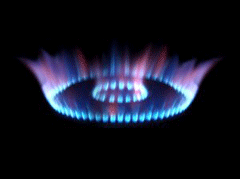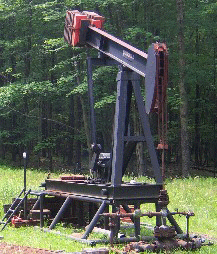Gassing Up
Air Date: Week of April 10, 2009

Natural gas is taking heat in the energy debate.
The Natural Gas industry says their home-produced product could help the country cut its CO2 emissions and oil imports. The fuel is cleaner than coal and newly discovered deposits here in the U.S. promise more supply and lower cost. But so far the Obama Administration is taking a pass on gas. Living on Earth’s Jeff Young reports from Washington.
Transcript
CURWOOD: And now from diesel to natural gas.
As Congress considers sweeping changes to our energy system, natural gas suppliers are hoping to win a bigger piece of the pie. Citing newly found sources of gas, they trumpet its low carbon potential for transportation, and say it’s a cleaner alternative to high carbon coal for generating power.
But others say not so fast. Living on Earth’s Jeff Young reports.
YOUNG: This August marks 150 years since the birth of the American oil and gas industry. It all started in Pennsylvania, near the town of Titusville, a fellow named Edwin Drake drilled down seventy feet for the first commercially successful oil well.

Drilling for natural gas in the Marcellus Shale. (Photo Kirk Johnson, Courtesy of the Sierra Club)
PICKENS: We are overwhelmed with natural gas. What a chance. What a chance for America to fix a critical problem.
YOUNG: Pickens was in Washington this month for the introduction of a bill by Oklahoma Democratic Representative Dan Bourne. It combines tax breaks and government purchases to expand the fleet of heavy duty vehicles powered by natural gas.
PICKENS: The only thing we’ve got, the only resource we have in America to really reduce dependency on foreign oil, you’ve got to go to natural gas. It is cleaner. It’s cheaper. It’s ours, and it’s abundant. What a wonderful solution to a very difficult problem.
YOUNG: Pickens and his allies on Capitol Hill hope the Obama administration will get on board. Obama’s chief of staff, Rahm Emanuel, introduced a similar natural gas bill when he was in Congress. But Obama’s energy secretary, Steven Chu, is not yet a believer.
CHU: You know, I’m agnostic, really, about it. The other stakeholders developed the biofuels using agricultural lumber wastes and plants specifically designed for growing energy. I don’t know which one will win. I think we could look at both. But remember, if we significantly shift our use in transportation to use of natural gas that will put a strain on natural gas for industrial uses, for heating and other things. So, it’s a complicated issue.

T. Boone Pickens has called for increased natural gas usage to ease the transition to wind energy. (Courtesy of T. Boone Pickens)
BOUCHER: Natural gas prices would spike. 58 percent of American homes are heated with natural gas. And we would see Americans across the board put to deep economic pain. Much of American industry is natural gas dependent. We would see broad economic disruption because of that flight to natural gas. We simply must avoid that.
YOUNG: As a key player in the House Energy Committee, Boucher is shaping the climate bill that committee’s working on. But gas industry experts say Boucher’s fears are a bit dated. Rick Smead is with Navigant Consulting, and the American Clean Skies Foundation, a natural gas lobby group.
SMEAD: Fuel switching to natural gas would be the most effective, lowest cost answer to the carbon impact of coal. It’s an asset that’s being overlooked in the policy debate.
YOUNG: Industry analysts say prices would rise some, but the newly abundant supply means big price spikes are unlikely. The country already has a lot of power plants built to burn natural gas that mostly sit idle because coal is cheaper. Simply firing them up more often could shift the country’s mix of fuels for electricity by ten percent or more. And Smead happily points out that gas has fewer problems than other air pollutants.
SMEAD: I always tell people that if they don’t believe that they should just go burn some coal in their kitchen next to their gas stove.

ARNOWITT: They actually had enough gas in their water that there was an explosion from the well. Not what you expect to get when you turn on the faucet.
YOUNG: It was an isolated incident, but exploding water tends to get people’s attention. And Arnowitt says the hydraulic fracturing, or fracking technique that drillers now use raises other water issues at the surface.
ARNOWITT: They need millions of gallons per well. Some streams were literally sucked dry. Our bigger concern is around what to do with all the wastewater, how is that going to be treated. There’s a whole range of contaminants in drilling wastewater. So our concern is that as drilling progresses, that we have the proper protections in place that this kind of thing doesn’t happen.
YOUNG: Drilling businesses say they’re working on safer ways to use surface water and minimize impact on water underground. The industry is well aware that state regulation will have a big effect on how much gas companies can afford to bring out of the ground, which means in this anniversary year for the petroleum business, Pennsylvania could once again be the place where the industry’s history is written.
For Living on Earth, I’m Jeff Young in Washington.
Links
To read an industry study on new supply of natural gas, click here.
Living on Earth wants to hear from you!
Living on Earth
62 Calef Highway, Suite 212
Lee, NH 03861
Telephone: 617-287-4121
E-mail: comments@loe.org
Newsletter [Click here]
Donate to Living on Earth!
Living on Earth is an independent media program and relies entirely on contributions from listeners and institutions supporting public service. Please donate now to preserve an independent environmental voice.
NewsletterLiving on Earth offers a weekly delivery of the show's rundown to your mailbox. Sign up for our newsletter today!
 Sailors For The Sea: Be the change you want to sea.
Sailors For The Sea: Be the change you want to sea.
 The Grantham Foundation for the Protection of the Environment: Committed to protecting and improving the health of the global environment.
The Grantham Foundation for the Protection of the Environment: Committed to protecting and improving the health of the global environment.
 Contribute to Living on Earth and receive, as our gift to you, an archival print of one of Mark Seth Lender's extraordinary wildlife photographs. Follow the link to see Mark's current collection of photographs.
Contribute to Living on Earth and receive, as our gift to you, an archival print of one of Mark Seth Lender's extraordinary wildlife photographs. Follow the link to see Mark's current collection of photographs.
 Buy a signed copy of Mark Seth Lender's book Smeagull the Seagull & support Living on Earth
Buy a signed copy of Mark Seth Lender's book Smeagull the Seagull & support Living on Earth

